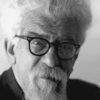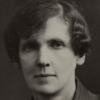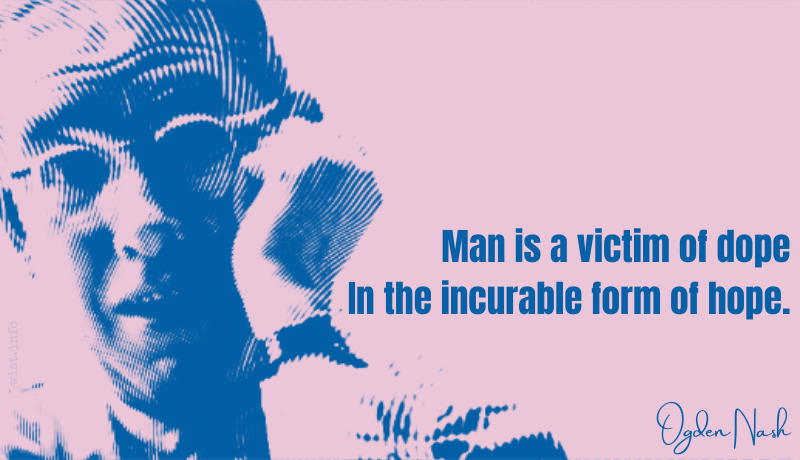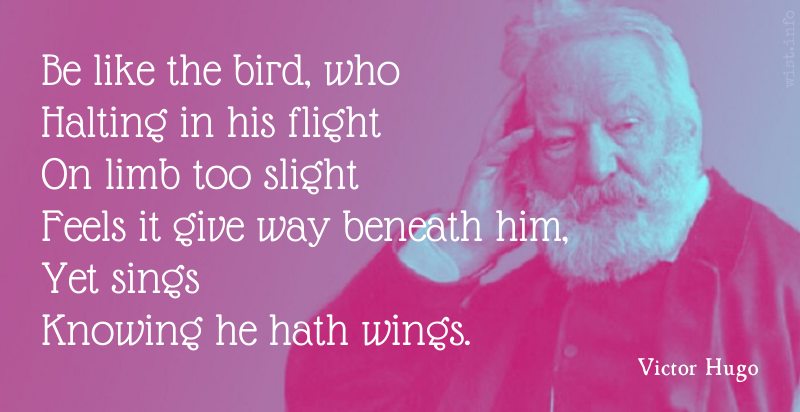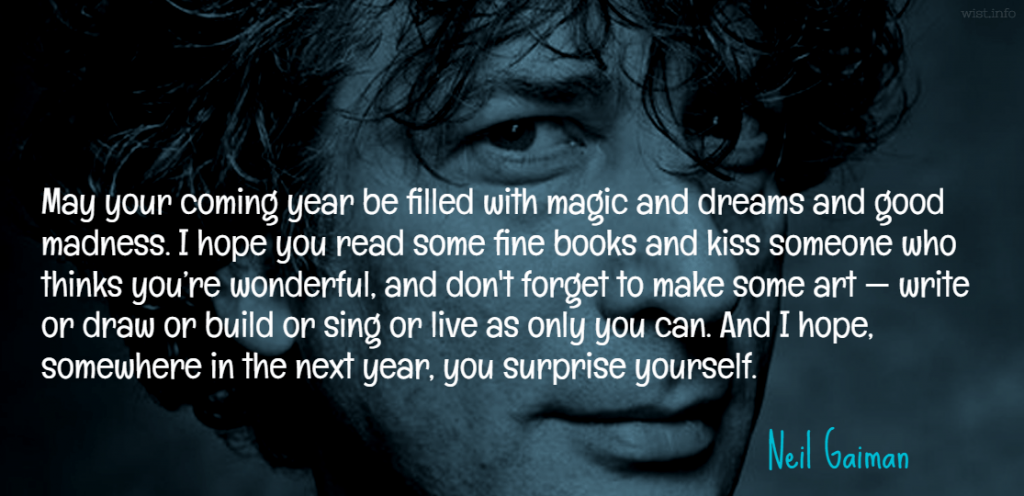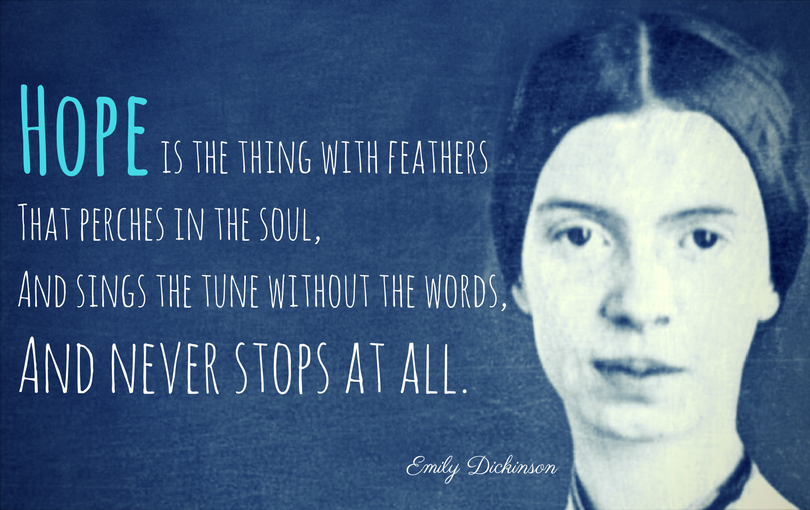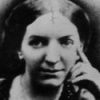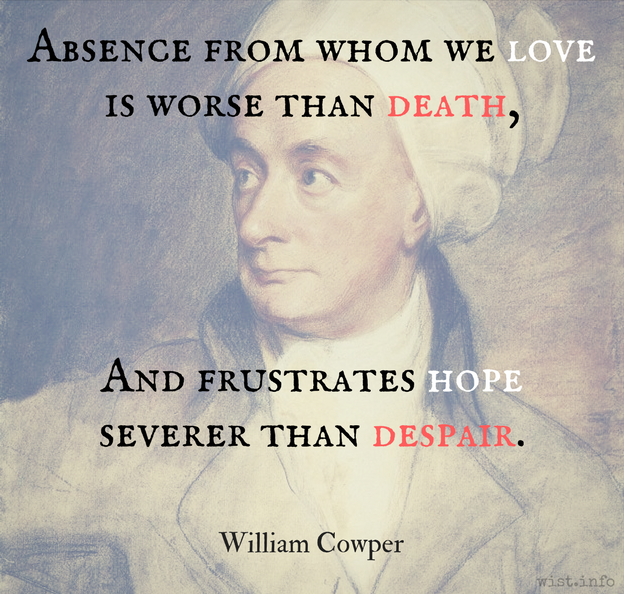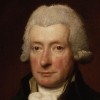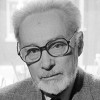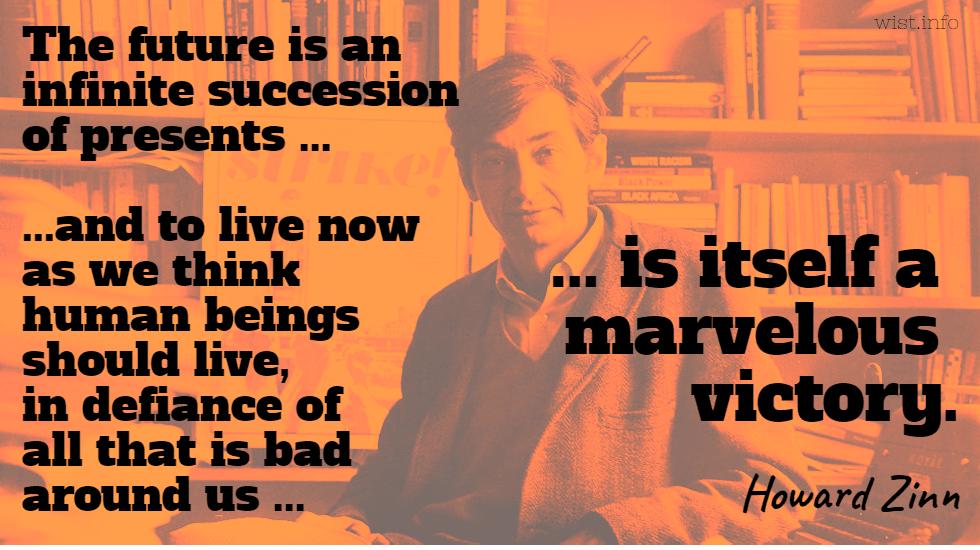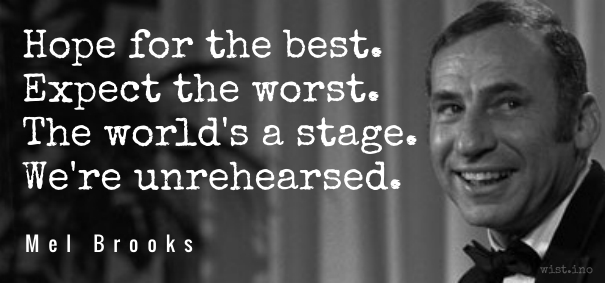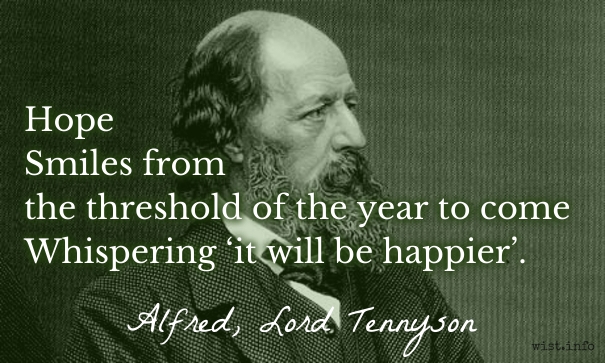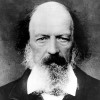What makes old age so sad is, not that our joys, but that our hopes then cease.
[Das Alter ist nicht trübe weil darin unsere Freuden, sondern weil unsere Hoffnungen aufhören.]
Jean Paul Richter (1763-1825) German writer, art historian, philosopher, littérateur [Johann Paul Friedrich Richter; pseud. Jean Paul]
Titan, Jubilee 6, cycle 34, “Fifth” (1803) [tr. Brooks (1863)]
(Source)
Quotations about:
hope
Note not all quotations have been tagged, so Search may find additional quotes on this topic.
Yes, I am personally the victim of deferred dreams, of blasted hopes, but in spite of that I close today by saying I still have a dream, because, you know, you can’t give up in life. If you lose hope, somehow you lose the vitality that keeps life moving, you lose that courage to be, that quality that helps you go on in spite of it all. And so today I still have a dream.
Martin Luther King, Jr. (1929-1968) American clergyman, civil rights leader, social activist, preacher
“A Christmas Sermon on Peace,” Ebenezer Baptist Church, Atlanta (1967-12-24)
(Source)
Broadcast by CBC Radio as the final of King's Massey Lectures, "Conscience for Change." Collected in Conscience for Change, republished after his assassination as The Trumpet of Conscience (1968).
This basic clash of ideas and wills is but one of the forces reshaping our globe — swept as it is by the tides of hope and fear, by crises in the headlines today that become mere footnotes tomorrow. Both the successes and the setbacks of the past year remain on our agenda of unfinished business. For every apparent blessing contains the seeds of danger — every area of trouble gives out a ray of hope — and the one unchangeable certainty is that nothing is certain or unchangeable.
Still you say, the young man has the hope of long life — a hope which the old cannot have. That hope is sheer wishful thinking, for what is more irrational than to count the uncertain as certain, the false as true? But the old man has nothing to look forward to at all. Even so, he is in better sort than the young, for he has obtained what the young only hope for: the young want to live a long life; the old have lived it.
[At sperat adulescens diu se victurum, quod sperare idem senex non potest. Insipienter sperat; quid enim stultius quam incerta pro certis habere, falsa pro veris? At senex ne quod speret quidem habet. At est eo meliore condicione quam adulescens, quoniam id quod ille sperat hic consecutus est: ille volt diu vivere, hic diu vixit.]
Marcus Tullius Cicero (106-43 BC) Roman orator, statesman, philosopher
De Senectute [Cato Maior; On Old Age], ch. 19 / sec. 68 (19.68) (44 BC) [tr. Copley (1967)]
(Source)
(Source (Latin)). Alternate translations:
But ye may saye that the man adolescent & yong hopith that he shall lyve longe & aftir that a man is olde he may not have such an hope. Therfor I answere you that the yong man hopith foliously if by cause of his yong age he wenith to live long, for he is not certayn therof nor knowith not the trouthe. Now ther is nothyng more foly thene is for to have & holde the doubtuose thyngys as certayn & the fals as true & if ye oppose agenst olde age that the olde man hath nothyng in hym whereby he may hope to lyve more, I answere you, Scipion & Lelius, that by this thyng is bettir the condicion & the astate of the olde man than of the yong man, for the yong man will lyve long & the olde man hath lyved long.
[tr. Worcester/Worcester/Scrope (1481)]
But a young man hopeth to live long, which an old man may not look to do. He truly feedeth himself with a vain and a foolish, hope. For what merer folly can there be, than to accompt and repute things which be doubtful and uncertain, for infallible and certain, and things that are false, for true? An old man hath nothing to hope for; but he is therefore in far better state and case than is a young man, for he hath already enjoyed and obtained that, which the young man doth but hope for. The one desireth to live long, the other hath already lived long.
[tr. Newton (1569)]
But the young man hopes to live long, which the old man cannot. He hopes foolishly; for what is greater folly, then to account uncertain things for certain, false for true? The old man hath nothing to hope for more; therefore he is in better state then the former, seeing that what the other wisheth for, he hath obtained already; the young man would live long, the old man hath lived long.
[tr. Austin (1648), ch. 21]
But vigorous Youth may his gay thoughts erect
To many years, which Age must not expect,
But when he sees his airy hopes deceiv'd,
With grief he saies, who this would have believ'd?
We happier are then they, who but desir'd
To possess that, which we long since acquir'd.
[tr. Denham (1669)]
But Youth, you'll say perhaps, may live in Hopes of Length of Days, when we are deprived even of all Hope. A childish Hope this indeed! To hold Uncertainties for Certainties, and Falsity for Truth! Old Age, you say, has not even Hope for its Relief; but, even in that Respect, is it not far preferable to Youth, in being actually possessed of what the other only hopes for? Long Life is sure on the one side, and only wished for on the other.
[tr. Hemming (1716)]
But the young Man is in Hopes of Living long, which the Old cannot. I must tell him he hopes foolishly; for, can there be a greater Instance of Folly than to make sure of Uncertainties; or embrace Falsities for Truth? The Old Man has nothing more to hope for; then he is in a better State than the Young one, since what this hopes for, the other has already attain'd: The one is in Hopes of Living long, the other has done it.
[tr. J. D. (1744)]
It may however be said, perhaps, that Youth has Room at least to hope they have Length of Life before them, which in Old Men would be vain. But foolish is that Hope: For what can be more absurd, than to build on utter Uncertainties, and account on that for sure, which probably may never happen? And to what is alleged, that the Old Man has no Room lest for Hope, I say, Just so much the happier is his Condition, than that of the Young; because he has already attained, and is sure of what the other only wishes and hopes for: The one wishes to live long, the other is at the End of that Wish, he has got it; for he has lived long already.
[tr. Logan (1744)]
It will be replied, perhaps, that "youth may at least entertain the hope of enjoying many additional years; whereas an old man cannot rationally encourage so pleasing an expectation." But is it not a mark of extreme weakness to rely upon precarious contingencies, and to consider an event as absolutely to take place, which is altogether doubtful and uncertain? But admitting that the young may indulge this expectation with the highest reason, still the advantage evidently lies on the side of the old; as the latter is already in possession of that length of life which the former can only hope to attain.
[tr. Melmoth (1773)]
But a young man hopes that he shall live long; which same thing an old man cannot hope. He hopes absurdly. For what is sillier than to hold uncertainties for certainties, the false for true? An old man has not even what he may hope; but he is by that in a better condition than the young man, since that which the former hopes for, the latter has attained. The former wishes to live long; the latter has lived long.
[Cornish Bros. ed. (1847)]
Yet a young man hopes that he will live a long time, which expectation an old man cannot entertain. His hope is but a foolish one: for what can be more foolish than to regard uncertainties as certainties, delusions as truths? An old man indeed has nothing to hope for; yet he is in so much the happier state than a young one; since he has already attained what the other is only hoping for. The one is wishing to live long, the other has lived long.
[tr. Edmonds (1874)]
But, it is said, the young man hopes to live long, while the old man can have no such hope. The hope, at any rate, is unwise; for what is more foolish than to take things uncertain for certain, false for true? Is it urged that the old man has absolutely nothing to hope? For that very reason he is in a better condition than the young man, because what the youth hopes he has already obtained. The one wishes to live long; the other has lived long.
[tr. Peabody (1884)]
Yes, you will say; but a young man expects to live long; an old man cannot expect to do so. Well, he is a fool to expect it. For what can be more foolish than to regard the uncertain as certain, the false as true? "An old man has nothing even to hope." Ah, but it is just there that he is in a better position than a young man, since what the latter only hopes he has obtained. The one wishes to live long; the other has lived long.
[tr. Shuckburgh (1895)]
But you will say the young
Have hope of life, which is to us denied.
A foolish hope. For what more foolish is
Than where no surety is to think things sure,
Where all is doubtful to believe them fixed?
Granted the old man cannot even hope:
'Tis all the better since he has attained
To what the young man only hopes to gain:
The one desires long life, the other's lived.
[tr. Allison (1916)]
But, you may say, the young man hopes that he will live for a long time and this hope the old man cannot have. Such a hope is not wise, for what is more unwise than to mistake uncertainty for certainty, falsehood for truth? They say, also, that the old man has nothing even to hope for. Yet he is in better case than the young man, since what the latter merely hopes for, the former has already attained; the one wishes to live long, the other has lived long.
[tr. Falconer (1923)]
There is a crucial difference between a young man and an old one: the one hopes for a long life yet to come, and the other knows that his time is nearly up. But a hope is only a hope: what is more foolish than to confuse what is uncertain with what is certain, and what is false with what is true? The young man who lives in a state of great expectations is much worse off than the old man who looks forward to nothing. One can only dream of what the other has accomplished: one wants to live a long time, but the other already has.
[tr. Cobbold (2012)]
But, you say, that is not the point. The point is that a young person can reasonably hope to live a long time and an old one cannot. What an unwise hope. I mean, what is more follish than to value uncertainty above certainty? Look at life this way, what the young person only hopes for (and the hope is uncertain, as we have seen), the old person already has. The one hopes to live a long time, the other has already done so.
[tr. Gerberding (2014)]
But they say a young man hopes in a long lease
Of life while an old man awaits its surcease.
Taking certain for uncertain is a wish,
Like taking false for true, completely foolish.
But, they add, even at the end of the rope
An old man is in a better shape than a young man
For he has already fulfilled his life’s hope.
One wants the long life the other had in full measure,
ut dear gods what is “long” in man’s nature?
[tr. Bozzi (2015)]
But you may argue that young people can hope to live a long time, whereas old people cannot. Such hope is not wise, for what is more foolish than to mistake something certain for what is uncertain, or something false for what is true? You might also say8 that an old man has nothing at all to hope for. But he in fact possesses something better than a young person. For what youth longs for, old age has attained. A young person hopes to have a long life, but an old man has already had one.
[tr. Freeman (2016)]
But the young person hopes to live for a long time, a very hope which the old person cannot hold. They hope unwisely for what is more foolish than to take uncertainty for certainty and falsehood for truth. They claim also that the old person has nothing to hope for. But the elderly are in a better place than the young because the young merely hope for what the elderly have obtained and the one wishes to live long, while the other has already done so.
[tr. @sentantiq (2021)]
Hope is the feeling we have that the feeling we have is not permanent.
Mignon McLaughlin (1913-1983) American journalist and author
The Neurotic’s Notebook, ch. 5 (1963)
(Source)
Ambition is to the mind, what the cap is to the falcon; it blinds us first, and then compels us to tower, by reason of our blindness. But alas, when we are at the summit of a vain ambition, we are also at the depth of real misery. We are placed where time cannot improve, but must impair us; where chance and change cannot befriend, but may betray us; in short, by attaining all we wish, and gaining all we want, we have only reached a pinnacle, where we have nothing to hope, but every thing to fear.
Charles Caleb "C. C." Colton (1780-1832) English cleric, writer, aphorist
Lacon: Or, Many Things in Few Words, Vol. 1, § 37 (1820)
(Source)
There is no sweeter pleasure than to surprise a man by giving him more than he expected.
[Il n’est pas de plaisir plus doux que de surprendre un homme en lui donnant plus qu’il n’espère.]
Charles Baudelaire (1821-1867) French poet, essayist, art critic
Le Spleen de Paris (Petits Poèmes en Prose), No. 28 “The Counterfeit Money [La Fausse Monnaie]” (1869) [tr. Shipley (1919)]
(Source)
(Source (French)). Alternate translations:
There is no sweeter pleasure than to surprise a man by giving him more than he expects.
[tr. Varèse (1970)]
There is no sweeter pleasure than surprising a man by giving him more than he hopes for.
[tr. Kaplan (1989)]
KENT: Fortune, good-night. Smile once more; turn thy wheel.
William Shakespeare (1564-1616) English dramatist and poet
King Lear, Act 2, sc. 2, l. 188 (2.2.188) (1606)
(Source)
When you live with a joyful sense of purpose, when you infuse your life with a greater purpose beyond your individual self, every aspect of your karma can become a brilliant facet of your mission. You can transform sorrow and adversity of any sort into joy, stability, health, and prosperity. By changing poison into medicine and accomplishing your inner revolution, you can use every experience of karma to encourage others who suffer from the same problems that you overcame.
You can become an ambassador of hope, an essential and radiant treasure of humanity, in which you recognize that all who have ever lived are members of your extended family.
As you continue to spread light in this way, actively doing good in the world, that energy will come back to you in abundant positivity. When you refuse to perpetuate any bad that has been done to you, you can free yourself from the chains of negativity.
Tina Turner (1939-2023) American singer, songwriter, actress [b. Anna Mae Bullock]
Happiness Becomes You, ch. 8 (2020)
(Source)
All who strive to live for something beyond mere selfish aims find their capacities for doing good very inadequate to their aspirations. They do so much less than they want to do, and so much less than they, at the outset, expected to do, that their lives, viewed retrospectively, inevitably look like failure.
Lydia Maria Child (1802-1880) American abolitionist, activist, journalist, suffragist
Letter to John Fraser (1868)
(Source)
Blest is the man who cheats the stormy sea
And safely moors beside the sheltering quay;
So, blest is he who triumphs over trial.
One man, by various means, in wealth or strength
Outdoes his neighbour; hope in a thousand hearts
Colours a thousand different dreams; at length
Some find a dear fulfilment, some denial.
But this I say,
That he who best
Enjoys each passing day
Is truly blest.[εὐδαίμων μὲν ὃς ἐκ θαλάσσας
ἔφυγε χεῖμα, λιμένα δ᾽ ἔκιχεν:
εὐδαίμων δ᾽ ὃς ὕπερθε μόχθων
ἐγένεθ᾽: ἑτέρᾳ δ᾽ ἕτερος ἕτερον
ὄλβῳ καὶ δυνάμει παρῆλθεν.
μυρίαι δ᾽ ἔτι μυρίοις
εἰσὶν ἐλπίδες: αἳ μὲν
τελευτῶσιν ἐν ὄλβῳ
βροτοῖς, αἳ δ᾽ ἀπέβησαν:
τὸ δὲ κατ᾽ ἦμαρ ὅτῳ βίοτος
εὐδαίμων, μακαρίζω.]Euripides (485?-406? BC) Greek tragic dramatist
Bacchæ [Βάκχαι], l. 902ff (Stasimon 3, Epode) [Chorus/Χορός] (405 BC) [tr. Vellacott (1973)]
(Source)
(Source (Greek)). Alternate translations:
Blest is the man who 'scapes the stormy wave.
And in the harbour finds repose:
He too is blest, 'midst dangers brave,
Who soars above the malice of his foes:
And now these, now those possess
Superior talents or success;
Distinct their aims; but hope each bosom fires.
There are, a rich encrease who find,
The vows of some are scatter'd in the wind:
But in my judgement blest are they
Who taste, tho' only for the day.
The joys their soul desires.
[tr. Wodhull (1809)]
Happy is he who has fled a storm on the sea, and reached harbor. Happy too is he who has overcome his hardships. One surpass another in different ways, in wealth or power. There are innumerable hopes to innumerable men, and some result in wealth to mortals, while others fail. But I call him blessed whose life is happy day today.
[tr. Buckley (1850)]
Who hath 'scaped the turbulent sea,
And reached the haven, happy he!
Happy he whose toils are o'er
In the race of wealth and power!
This one her, and that one there,
Passes by, and everywhere
Still expectant thousands over
Thousands hopes are seen to hover,
Some to mortals end in bliss;
Some have already fled away:
Happiness alone is his
That happy is to-day.
[tr. Milman (1865)]
Happy he, who from the storm,
Has the breaker escaped, and the harbour has reached;
Happy he who after toil
Is the victor, for many the ways in which man
Wins him power, and wins him wealth.
Thousand-fold ever to thousands of men,
Hope follows upon hope,
With some it grows unceasingly,
With some it wastes to nothingness.
But he whose life is ever fresh,
Lives in unbroken happiness.
[tr. Rogers (1872), l. 865ff.]
Happy is he who hath escaped the wave from out the sea, and reached the haven; and happy he who hath triumphed o’er his troubles; though one surpasses another in wealth and power; yet there be myriad hopes for all the myriad minds; some end in happiness for man, and others come to naught; but him, whose life from day to day is blest, I deem a happy man.
[tr. Coleridge (1891)]
Blest who from ravening seas
Hath 'scaped to haven-peace,
Blest who hath triumphed in endeavour's toil and throe.
This man to higher height
Attains, of wealth, of might,
Than that; yet myriad hopes in myriad hearts still glow:
To fair fruition brought
Are some, some come to nought:
Happy is he whose bliss from day to day doth grow.
[tr. Way (1898)]
Happy he, on the weary sea
Who hath fled the tempest and won the haven.
Happy whoso hath risen, free,
Above his striving. For strangely graven
Is the orb of life, that one and another
In gold and power may outpass his brother.
And men in their millions float and flow
And seethe with a million hopes as leaven;
And they win their Will, or they miss their Will,
And the hopes are dead or are pined for still;
But whoe'er can know,
As the long days go,
That To Live is happy, hath found his Heaven!
[tr. Murray (1902)]
-- Blessèd is he who escapes the storm at sea,
who comes home to his harbor.
-- Blessèd is he who emerges from under affliction.
-- In various ways one man outraces another in the race for wealth and power.
-- Ten thousand men possess ten thousand hopes.
-- A few bear fruit in happiness; the others go awry.
-- But he who garners day by day the good of life, he is happiest. Blessèd is he.
[tr. Arrowsmith (1960)]
Happy the man who from the sea
escapes the storm and finds harbor;
happy he who has surmounted
toils; and in different ways one surpasses another
in prosperity and power.
Besides this, for countless men there are countless
hopes -- some of them
reach to the end in prosperity
for mortals, and others depart;
but him whose life day by day
is happy do I count blessed.
[tr. Kirk (1970)]
Happy he from the sea escaping
out of the storm, arriving at anchorage;
happy he fleeing labour's straining;
in many manners may men surpass other men
in prosperity and in power.
Thousand-fold upon thousand-fold
hopes come crowding upon us,
and some finally prosper
for mortals, some are vanish'd:
who day by day has a livelihood of happiness, he is blessed
[tr. Neuburg (1988)]
Happy the man who withstands
life's assaults.
Somehow, in some way, some man surpasses some other
in position and fortune.
For millions of men there are millions of hopes.
For some, these ripen into happiness,
for others into nothing.
Count lucky the man who is happy on this one day.
[tr. Cacoyannis (1982)]
That man is blessed who fled the storm
At sea and reached the bay.
And he is blessed who rose above
His toil. In various ways
One man outstrips in wealth and power
Another: countless men
Have countless hopes: some end in joy,
But others drift way.
The man who day to day has luck
In life -- that man I bless.
[tr. Blessington (1993)]
Happy the man who escapes
the storm at sea and reaches harbor.
Happy, too, is he who overcomes
his toils. And in different ways one man
surpasses another in prosperity and power.
Besides, countless are the hopes
of countless men, Some of those hopes
end in prosperity for mortals, others vanish.
But I count him blessed whose life,
from day to day, is happy.
[tr. Esposito (1998)]
Happy the man who has come away
safe on the beach from a storm at sea,
happy the man who has risen above
trouble and toil. Many are the ways
one man may surpass another
in wealth or power,
and beyond each hope there beckons another
hope without number.
Hope may lead a man to wealth,
hope may pass away;
but I admire a man when he
is happy in an ordinary life.
[tr. Woodruff (1999)]
Happy is he who escapes
A storm at sea and finds safe harbor.
Happy is he who has risen above
Great toils. In different ways,
Some persons outdo others
In their wealth and power.
And hopes are as many as those who hope --
Some will end in rich reward, others in nothing.
But those whose lives are happy
Day by day -- those
I call the blesséd.
[tr. Gibbons/Segal (2000)]
Blessed is he that out of the sea
escapes the storm and wins the harbor;
blessed he who triumphs over
trouble: one man surpasses another
in respect to wealth or power.
Furthermore, in countless hearts
there live countless hopes, some
ending in good fortune,
though some vanish away.
But the man whose life today is happy,
him I count blessed.
[tr. Kovacs (2002)]
Joy of the storm endured,
And the harbour safely reached.
Joy of hardship overcome.
Joy of striving for wealth and power.
Joy of hope. Joy of dreams,
Fulfilled or unfulfilled.
And most blessed they who takes their joy
In the simple detail of the day by day --
[tr. Teevan (2002)]
Happy is the man who has escaped the storms of life’s angry seas and found a harbour; and happy is the man who have endured those storms.
Men are infinite in number and their hopes have no end and some of these hopes bring joy to some and nothing to others.
I say blessed is the man whose life has been happy -- so far.
These are useful pieces of advice. True wisdom.
[tr. Theodoridis (2005)]
Blessed is the one who's fled the
Storm at sea and come to harbour;
And happy is he who rises above
Hardships; for one may sur-
Pass another in wealth or in power,
But these are a lot hopes to a lot of
Different people; and many end in
Happiness while others fail mis’rably
But the one who's happy day-to-day,
Is the one who's truly blessed.
[tr. Valerie (2005)]
Whoever has escaped a storm at sea
is a happy man in harbour,
whoever overcomes great hardship
is likewise another happy man.
Various men outdo each other
in wealth, in power,
in all sorts of ways.
The hopes of countless men
are infinite in number.
Some make men rich;
some come to nothing,
So I consider that man blessed
who lives a happy life
existing day by day.
[tr. Johnston (2008), l. 1106ff]
Lucky is the man who escapes a storm at sea
and finds his way home to safe harbour --
the man delivered from hardship.
We all compete for wealth and power,
and for every thousand hearts a thousand hopes.
Some wither, some bear fruit.
But the one who lives from day to day,
finding good where he can:
he is happy --
he is a lucky man.
[tr. Robertson (2014)]
Fortunate is the one who flees
The swell of the sea and returns to harbor.
Fortunate is the one who survives through troubles.
One is greater than another in different things,
He surpasses in fortune and power --
But in numberless hearts still
Are numberless hopes: some result
In good fortune, but other mortal dreams
Just disappear.
Whoever has a happy life to-day,
I consider fortunate.
[tr. @sentantiq (2018)]
Happy is the one who escapes a sea-storm
and comes home to the harbor.
And happy is the one who stands against their hardships.
Happy are they who endure.
One man may exceed another, in his own way.
In wealth.
In power.
Countless hopes for yet-more-countless people.
Sometimes hope wins out, gives us riches --
And sometimes it doesn’t. Sometimes we fail.
But the one who can live in spite of this,
who is happy day to day.
That one is blessed.
[tr. Pauly (2019)]
Blessed is the one who finds a harbour safe from the winter sea. Blessed is the one who travels beyond affliction. Blessed is the one who wins great joy. Numberless more have their dreams. Some hopes are fulfilled, some vanish. Whoever lives happily from day to day I bless.
[tr. Behr/Foster (2019)]
Fortunate [eudaimōn] is he who has fled a storm on the sea and reached harbor. Eudaimōn too is he who has overcome his toils. Different people surpass others in various ways, be it in wealth [olbos] or in power. Mortals have innumerable hopes, and some come to telos in prosperity [olbos], while others fail. I deem him blessed whose life is eudaimōn day by day.
[tr. Buckley/Sens/Nagy (2020)]
Hope is the feeling we have that the feeling we have is not permanent.
Mignon McLaughlin (1913-1983) American journalist and author
The Neurotic’s Notebook, ch. 5 (1963)
(Source)
This phrase is often cited to Jean Kerr. That's because she paraphrases it in her play, Finishing Touches, Act 3 (1974):
FELICIA: Do you know the book The Neurotic's Notebook? There's a line in it I say to myself when I get discouraged. It goes: "Hope is the feeling you have that the feeling you have isn't permanent."
Worthy work carries with it the hope of pleasure in rest, the hope of the pleasure in our using what it makes, and the hope of pleasure in our daily creative skill. All other work but this is worthless; it is slaves’ work — mere toiling to live, that we may live to toil.
William Morris (1834-1896) British textile designer, writer, socialist activist
Signs of Change, ch. 6 (1888)
(Source)
My theory has always been that if we are to dream, the flatteries of hope are as cheap, and pleasanter than the gloom of despair.
Thomas Jefferson (1743-1826) American political philosopher, polymath, statesman, US President (1801-09)
Letter (1817-06-14) to François de Marbois
(Source)
Hope is itself a species of happiness, and, perhaps, the chief happiness which this world affords: but, like all other pleasures immoderately enjoyed, the excesses of hope must be expiated by pain; and expectations improperly indulged must end in disappointment.
Do not get lost in a sea of despair. You must not become bitter or hostile; be hopeful and optimistic. Our struggle is not the struggle of a day, a week, a month, or a year. It is the struggle of a lifetime. Never, ever be afraid to make some noise and get in good trouble, necessary trouble. We will find a way to make a way out of no way.
John Lewis (1940-2020) American politician and civil rights leader
Stump speech
Lewis used variations of these phrases regularly through his career. Several abridged combinations showed up in social media:
Ours is not the struggle of a day, a week, a month, or a year--it is the struggle of lifetime. We must build a world at peace with itself.
[Twitter (14 Jul 2016)]
Do not get lost in a sea of despair. Be hopeful, be optimistic. Our struggle is not the struggle of a day, a week, a month, or a year, it is the struggle of a lifetime. Never, ever be afraid to make some noise and get in good trouble, necessary trouble.
[Twitter (27 Jun 2018)]
Do not get lost in a sea of despair. Do not become bitter or hostile. Be hopeful, be optimistic. Never, ever be afraid to make some noise and get in good trouble, necessary trouble. We will find a way to make a way out of no way.
[Twitter (16 Jul 2019)]
A religious man is a person who holds God and man in one thought at one time, at all times, who suffers in himself harm done to others, whose greatest passion is compassion, whose greatest strength is love and defiance of despair.
Abraham Joshua Heschel (1907-1972) Polish-American rabbi, theologian, philosopher
“What Ecumenism Is” (1963)
(Source)
Collected in Susanna Heschel, ed., Moral Grandeur and Spiritual Audacity (1996). In other essays in the book, he uses the first clause ("a person who holds God and man in one thought, at one time, at all times") as a definition of a "prophet."
“Faith, hope, and charity, these three; but the greatest of these is charity.”
There is a deeper meaning in this text than we at first see. Of “these three,” two concern ourselves; the third concerns others. When faith and hope fail, as they do sometimes, we must try charity, which is love in action. We must speculate no more on our duty, but simply do it. When we have done it, however blindly, perhaps Heaven will show us the reason why.
Dinah Craik (1826-1887) English novelist and poet [b. Dinah Maria Mulock]
Christian’s Mistake, ch. 2 (1865)
(Source)
A reference to the Bible, 1 Cor. 13:13, the "Three Theological Virtues."
Yet, if nothing else, each time a new baby is born there is a possibility of reprieve. Each child is a new being, a potential prophet, a new spiritual prince, a new spark of light precipitated into the outer darkness. Who are we to decide that it is hopeless?
R. D. Laing (1927-1989) Scottish psychiatrist [Ronald David Laing]
The Politics of Experience, ch. 1 (1967)
(Source)
Cynicism is a form of cowardice, a failure of courage to hope.
Merle Shain (1935-1989) Canadian journalist and author
Hearts That We Broke Long Ago, ch. 11 (1983)
(Source)
Your task is to endure and save yourselves for better days.
[Durate, et vosmet rebus servate secundis.]
Virgil (70-19 BC) Roman poet [b. Publius Vergilius Maro; also Vergil]
The Aeneid [Ænē̆is], Book 1, l. 207 (1.207) [Aeneas] (29-19 BC) [tr. West (1990)]
(Source)
(Source (Latin)). Alternate translations:
Live, and preserve yourselves for better chance.
[tr. Ogilby (1649)]
Endure the hardships of your present state;
Live, and reserve yourselves for better fate.
[tr. Dryden (1697)]
Bear up, and live for happier days.
[tr. Conington (1866)]
Be firm,
And keep your hearts in hope of brighter days.
[tr. Cranch (1872), l. 263ff]
Keep heart, and endure till prosperous fortune come.
[tr. Mackail (1885)]
Abide, endure, and keep yourselves for coming days of joy.
[tr. Morris (1900)]
Bear up; reserve you for a happier day.
[tr. Taylor (1907), l. 238]
Have patience all!
And bide expectantly that golden day.
[tr. Williams (1910)]
Endure, and keep yourselves for days of happiness.
[tr. Fairclough (1916)]
Endure, and keep yourself for better days.
[tr. Humphries (1951)]
Hold on, and find salvation in the hope of better things!
[tr. Day Lewis (1952)]
Hold out, and save yourselves for kinder days.
[tr. Mandelbaum (1971)]
Be patient:
Save yourselves for more auspicious days.
[tr. Fitzgerald (1981), ll. 282-83]
Endure,
and preserve yourselves for happier days.
[tr. Kline (2002)]
Endure, and save yourselves for happier times.
[tr. Lombardo (2005)]
Bear up.
Save your strength for better times to come.
[tr. Fagles (2006)]
Hold on.
Save your strength for better days to come.
[tr. Bartsch (2021)]
On another occasion the question was put to him, what hope is? and his answer was, “The dream of a waking man.”
[ἐρωτηθεὶς τί ἐστιν ἐλπίς, “ἐγρηγορότος,” εἶπεν, “ἐνύπνιον.”]
Aristotle (384-322 BC) Greek philosopher
Attributed in Diogenes Laërtius, Lives and Opinions of Eminent Philosophers [Vitae Philosophorum], Book 5, sec. 11 [tr. Yonge (1853)]
(Source)
(Source (Greek)). Alternate translations:
He was asked to define hope, and he replied, "It is a waking dream."
[tr. Hicks (1925), sec. 18]
When asked what hope is, he said “It is dreaming while awake.”
[tr. @sentantiq (2016), 5.21]
When asked to define hope, he said, "It is a waking dream."
[tr. Mensch (2018)]
“Supposing a tree fell down, Pooh, when we were underneath it?”
“Supposing it didn’t,” said Pooh after careful thought.
Piglet was comforted by this.A. A. Milne (1882-1956) English poet and playwright [Alan Alexander Milne]
House at Pooh Corner, ch. 8 “Piglet Does a Very Grand Thing” (1928)
(Source)
Men use up their lives in heart-breaking political struggles, or get themselves killed in civil wars, or tortured in the secret prisons of the Gestapo, not in order to establish some central-heated, air-conditioned, strip-lighted Paradise, but because they want a world in which human beings love one another instead of swindling and murdering one another. And they want that world as a first step. Where they go from there is not so certain, and the attempt to foresee it in detail merely confuses the issue.
George Orwell (1903-1950) English writer [pseud. of Eric Arthur Blair]
“Can Socialists Be Happy?” Tribune (1943-12-20) [as John Freeman]
(Source)
If you wish to succeed in life, make perseverance your bosom friend, experience your wise counselor, caution your elder brother, and hope your guardian genius.
Joseph Addison (1672-1719) English essayist, poet, statesman
(Attributed)
Broadly attributed to Addison, but possibly a 19th Century creation. The earliest found appearance is in 1854, and the earliest attribution to Addison in in 1862.
A common fallacy in much of the adverse criticism to which science is subjected today is that it claims certainty, infallibility and complete emotional objectivity. It would be more nearly true to say that it is based upon wonder, adventure and hope.
Cyril Norman Hinshelwood (1897-1967) British chemist and Nobel laureate
“Classics among the intellectual disciplines,” Presidential Address to the Classical Association, Hull, UK (1959-04-09)
Quoted in the Sunday Times (1959-05-17), and in E. J. Bowen's obituary of Hinshelwood, in Chemistry in Britain, Vol. 3 (1967), p. 534.
We should take comfort that while we may have more still to endure, better days will return: we will be with our friends again; we will be with our families again; we will meet again.
Elizabeth II (b. 1926) Queen of the United Kingdom and the Commonwealth realms
Address to the Nation (5 Apr 2020)
(Source)
On the COVID-19 Pandemic. The last line is an allusion to the famous WWII song.
And however dark the skies may appear,
And however souls may blunder,
I tell you it all will work out clear,
For good lies over and under.Ella Wheeler Wilcox (1850-1919) American author and poet.
“Insight,” An Erring Woman’s Love (1892)
(Source)
Never grow a wishbone, daughter, where your backbone ought to be.
Clementine Paddleford (1898-1967) American food writer
A Flower for My Mother (1958)
(Source)
Quoting her mother.
There is said to be hope for a sick man, as long as there is life.
[Aegroto dum anima est, spes esse dicitur.]
Marcus Tullius Cicero (106-43 BC) Roman orator, statesman, philosopher
Epistulae ad Atticum [Letters to Atticus], Book 9, Letter 10 (9.10), sec. 3, l. 19 (18 Mar 49 BC) [tr. Shackleton Bailey (1968)]
(Source)
Alt. trans.: "A sick man is said to have hope, so long as he has breath." [tr. Winstedt (1913)]
Often paraphrased as: "While there is life there is hope" [Dum anima est, spes est.] See also Theocritus, "While there's life there’s hope, and only the dead have none" (Idyll #4, l. 42 [tr. Gow]).
Every parent is at some time the father of the unreturned prodigal, with nothing to do but keep his house open to hope.
John Ciardi (1916-1986) American poet, writer, critic
“Of Time and Chances: A Parental Reverie,” Saturday Review (1972-03-18)
(Source)
Man is a victim of dope
In the incurable form of hope.Ogden Nash (1902-1971) American poet
“Good-bye, Old Year, You Oaf, or Why Don’t They Pay the Bonus?” (1935)
(Source)
Be like the bird, who
Halting in his flight
On limb too slight
Feels it give way beneath him,
Yet sings
Knowing he hath wings.[Soyez comme l’oiseau, posé pour un instant
Sur des rameaux trop frêles,
Qui sent ployer la branche et qui chante pourtant,
Sachant qu’il a des ailes!]Victor Hugo (1802-1885) French writer
“In the Church of *** [Dans l’eglise de ***],” Songs of Dusk [Les chants du crepuscule], #33 sec. 6 (1836)
(Source)
Full French poem. Alternate translations:
Be like the bird that, on a bough too frail
To bear him, gaily sings!
He carols -- thought he slender branches fail:
He knows that he has wings.
[Source]
Be like the bird that seeks its short repose
And dauntless sings
Upon that bending twig, because it knows
That it has wings.
[Source]
Be like that bird, that halting in her flight
A while on boughs too slight;
Feels them give way beneath her,
And yet sings, yet sings,
Knowing that she hath wings.
[Laura Sedgwick Collins, 1890s song, "Be Like That Bird"]
Thou art like the bird
That alights and sings
Though the frail spray bends --
For he knows he has wings.
[tr. Kemble (Butler)]
Be as a bird that --
Pausing in its flight --
Alights upon a branch too slight
And feeling that it bends beneath it
Sings -- knowing it has wings.
[Source]
It’s the possibility of having a dream come true that makes life interesting.
The people I respect most behave as if they were immortal and as if society was eternal. Both assumptions are false: both of them must be accepted as true if we are to go on eating and working and loving, and are to keep open a few breathing-holes for the human spirit. No millennium seems likely to descend upon humanity; no better and stronger League of Nations will be instituted; no form of Christianity and no alternative to Christianity will bring peace to the world or integrity to the individual; no “change of heart” will occur. And yet we need not despair, indeed, we cannot despair; the evidence of history shows us that men have always insisted on behaving creatively under the shadow of the sword; that they have done their artistic and scientific and domestic stuff for the sake of doing it, and that we had better follow their example under the shadow of the aeroplanes.
E. M. Forster (1879-1970) English novelist, essayist, critic, librettist [Edward Morgan Forster]
“What I Believe,” The Nation (16 Jul 1938)
(Source)
May your coming year be filled with magic and dreams and good madness. I hope you read some fine books and kiss someone who thinks you’re wonderful, and don’t forget to make some art — write or draw or build or sing or live as only you can. And I hope, somewhere in the next year, you surprise yourself.
Neil Gaiman (b. 1960) British author, screenwriter, fabulist
Blog entry (2001-12-31), “As I Was Saying”
(Source)
Hope is the thing with feathers
That perches in the soul,
And sings the tune without the words,
And never stops at all.
Take hope from the heart of man and you make him a beast of prey.
Ouida (1839-1908) English novelist [pseud. of Maria Louise Ramé]
A Village Commune, ch. 20 (1881)
(Source)
Absence from whom we love is worse than death,
And frustrate hope severer than despair.William Cowper (1731-1800) English poet
“Hope, like the short-lived ray that gleams awhile”
(Source)
To be hopeful in bad times is not just foolishly romantic. It is based on the fact that human history is a history not only of cruelty, but also of compassion, sacrifice, courage, kindness.
What we choose to emphasize in this complex history will determine our lives. If we see only the worst, it destroys our capacity to do something. If we remember those times and places — and there are so many — where people have behaved magnificently, this gives us the energy to act, and at least the possibility of sending this spinning top of a world in a different direction.
And if we do act, in however small a way, we don’t have to wait for some grand utopian future. The future is an infinite succession of presents, and to live now as we think human beings should live, in defiance of all that is bad around us, is itself a marvelous victory.
Howard Zinn (1922-2010) American historian, academic, author, social activist
“The Optimism of Uncertainty,” The Nation (2 Sep 2004)
(Source)
Adopted from Zinn's essay of the same name in Paul Loeb (ed.), The Impossible Will Take a Little While (2004). See also Zinn, "A Marvelous Victory" (23 Feb 2004).
I must confess, my friends, the road ahead will not always be smooth. There will be still rocky places of frustration and meandering points of bewilderment. There will be inevitable setbacks here and there. There will be those moments when the buoyancy of hope will be transformed into the fatigue of despair. Our dreams will sometimes be shattered and our ethereal hopes blasted. We may again with tear-drenched eyes have to stand before the bier of some courageous civil rights worker whose life will be snuffed out by the dastardly acts of bloodthirsty mobs. Difficult and painful as it is, we must walk on in the days ahead with an audacious faith in the future.
Martin Luther King, Jr. (1929-1968) American clergyman, civil rights leader, social activist, preacher
“Where Do We Go From Here?” Southern Christian Leadership Conference Presidential Address (16 Aug 1967)
(Source)
Maybe this is the chief thing the dog knows better than we do. There isn’t enough time in life to do anything but love and do our work with joy. We should sleep when we’re tired. Run with abandon. Always be happy to see each other. And never stop believing we will, someday, catch the squirrel.
There is freedom waiting for you,
On the breezes of the sky,
And you ask “What if I fall?”
Oh but my darling,
What if you fly?
Hope
Smiles from the threshold of the year to come
Whispering “it will be happier.”
I think perhaps we want a more conscious life. We’re tired of drudging and sleeping and dying. We’re tired of seeing just a few people able to be individualists. We’re tired of always deferring hope till the next generation. We’re tired of hearing politicians and priests and cautious reformers (and the husbands!) coax us, “Be calm! Be patient! Wait! We have the plans for a Utopia already made; just wiser than you.” For ten thousand years they’ve said that. We want our Utopia now — and we’re going to try our hands at it.
Sinclair Lewis (1885-1951) American novelist, playwright
Main Street, ch. 16 [Carol] (1920)
(Source)
ZOE: You sanguine about the kind of reception we’re apt to receive on an Alliance ship, Cap’n?
MAL: Absolutely. [Pause] What’s “sanguine” mean?
ZOE: “Sanguine”. Hopeful. Plus, point of interest: it also means “bloody”.
MAL: Well, that pretty much covers all the options, don’t it?
















